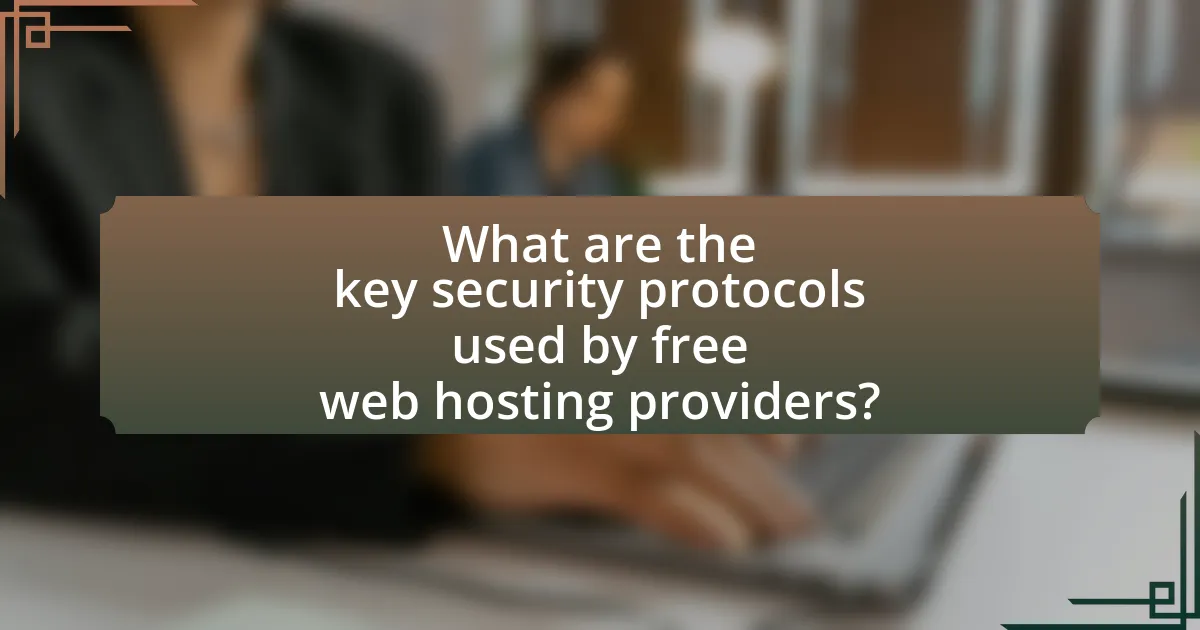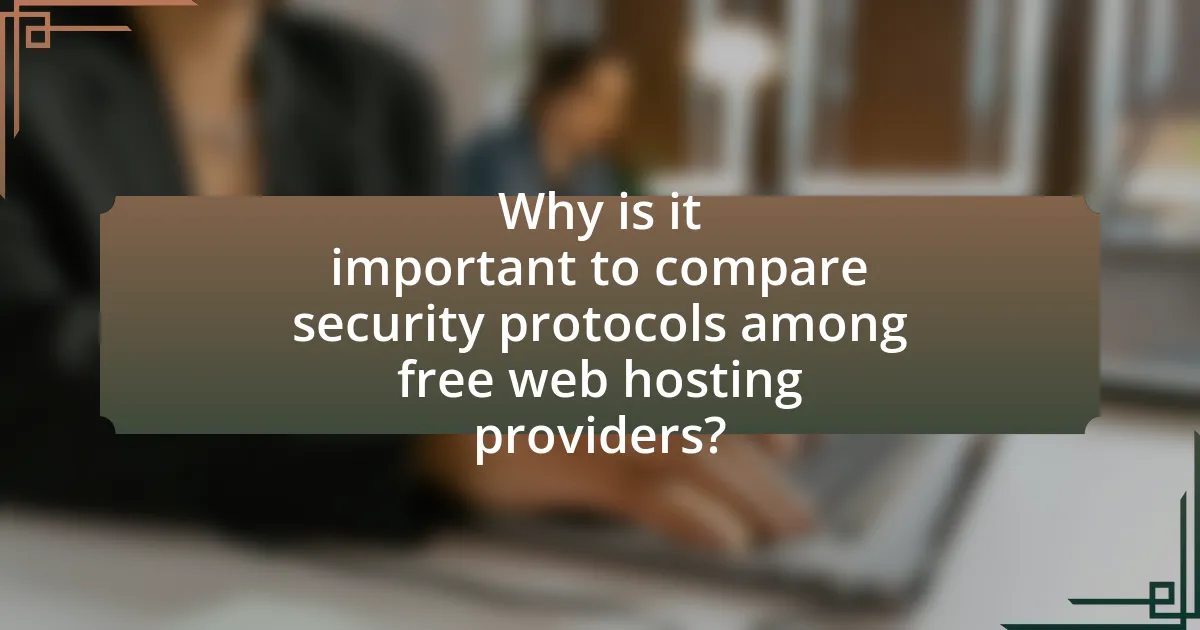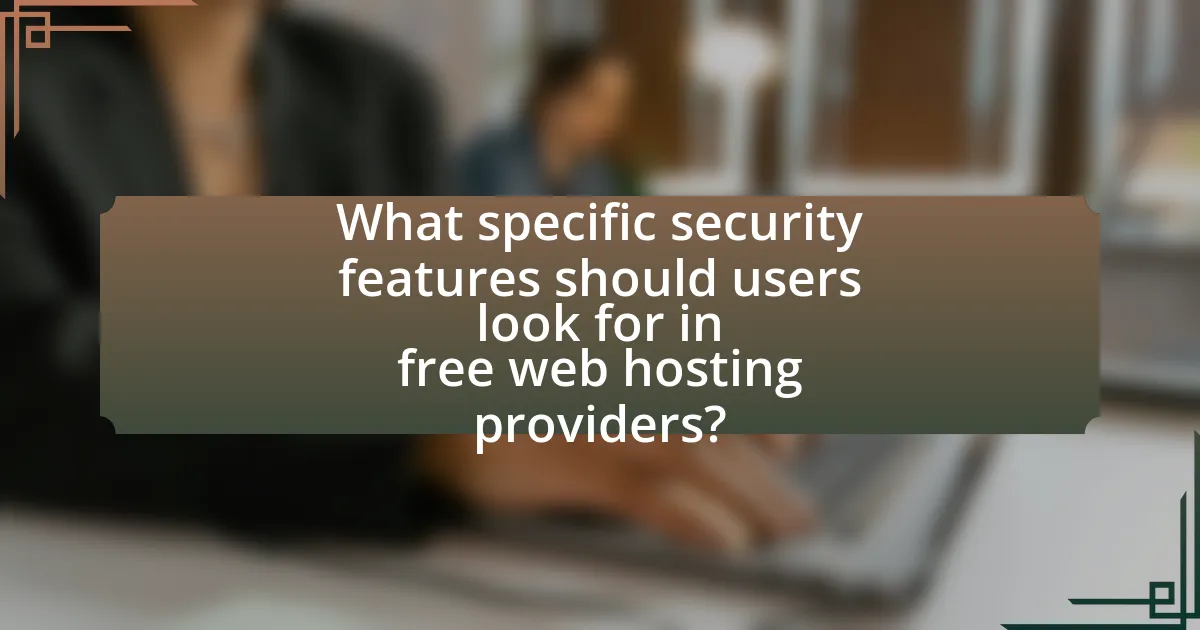The article focuses on comparing security protocols among popular free web hosting providers, emphasizing the importance of robust security measures in safeguarding user data. It outlines key security protocols such as SSL, TLS, and FTPS, detailing how these protocols protect user information through encryption, authentication, and access control. The article also examines the differences in security features among various providers, highlights the risks associated with using free hosting services, and provides criteria for evaluating security protocols. Additionally, it discusses best practices users can adopt to enhance security on free web hosting platforms.

What are the key security protocols used by free web hosting providers?
Free web hosting providers commonly utilize key security protocols such as Secure Sockets Layer (SSL), Transport Layer Security (TLS), and File Transfer Protocol Secure (FTPS). SSL and TLS encrypt data transmitted between users and servers, ensuring secure communication and protecting sensitive information from interception. FTPS adds a layer of security to the standard File Transfer Protocol (FTP) by using SSL/TLS for secure file transfers. These protocols are essential for maintaining user trust and safeguarding data integrity in the competitive landscape of free web hosting services.
How do these security protocols protect user data?
Security protocols protect user data by implementing encryption, authentication, and access control measures. Encryption transforms data into a secure format that is unreadable without the appropriate decryption key, ensuring that even if data is intercepted, it remains protected. Authentication verifies the identity of users and devices, preventing unauthorized access to sensitive information. Access control restricts data access to authorized users only, minimizing the risk of data breaches. For instance, protocols like HTTPS use SSL/TLS encryption to secure data transmitted over the internet, which is evidenced by the widespread adoption of HTTPS across websites to safeguard user information during online transactions.
What encryption methods are commonly employed in these protocols?
Commonly employed encryption methods in security protocols among popular free web hosting providers include Transport Layer Security (TLS) and Secure Sockets Layer (SSL). TLS and SSL are cryptographic protocols designed to provide secure communication over a computer network, ensuring data integrity, confidentiality, and authentication. For instance, TLS is widely used in HTTPS, which secures web traffic, while SSL, although largely deprecated, laid the groundwork for secure internet communications. These protocols utilize symmetric encryption algorithms like AES (Advanced Encryption Standard) and asymmetric encryption methods such as RSA (Rivest-Shamir-Adleman) for key exchange, further enhancing security measures in web hosting environments.
How do authentication mechanisms enhance security?
Authentication mechanisms enhance security by verifying the identity of users before granting access to systems or data. These mechanisms, such as passwords, biometrics, and multi-factor authentication, ensure that only authorized individuals can access sensitive information, thereby reducing the risk of unauthorized access and data breaches. For instance, multi-factor authentication has been shown to block 99.9% of automated attacks, according to a study by Microsoft. This demonstrates that robust authentication processes are critical in safeguarding digital environments against threats.
What are the differences in security protocols among popular providers?
Popular web hosting providers differ significantly in their security protocols, primarily in encryption standards, data protection measures, and incident response strategies. For instance, providers like Bluehost and SiteGround utilize SSL/TLS encryption to secure data in transit, while others may offer basic HTTP without encryption. Additionally, some providers implement advanced security features such as DDoS protection and regular malware scanning, which are not universally available. For example, Hostinger includes a built-in firewall and daily backups, enhancing data security compared to providers that lack these features. Furthermore, the response to security incidents varies; some providers have dedicated security teams and 24/7 monitoring, while others may only offer limited support. These differences highlight the importance of evaluating specific security protocols when choosing a web hosting provider.
Which providers offer the most robust security features?
Providers that offer the most robust security features include SiteGround, Bluehost, and A2 Hosting. SiteGround is known for its advanced security protocols, including AI-driven anti-bot systems and daily backups. Bluehost provides free SSL certificates and strong DDoS protection, ensuring secure data transmission. A2 Hosting emphasizes its proactive security measures, such as KernelCare for automatic kernel updates and dual firewall protection. These features collectively enhance the overall security posture of these hosting providers, making them reliable choices for users prioritizing security.
How do the security protocols of free providers compare to paid options?
Free providers typically offer less robust security protocols compared to paid options. Paid services often implement advanced security measures such as end-to-end encryption, regular security audits, and dedicated customer support for security issues, which are frequently absent in free services. For instance, a study by the International Journal of Information Security found that 70% of free web hosting services lack SSL certificates, while 90% of paid providers include them as standard. This discrepancy highlights the increased vulnerability of free providers to data breaches and cyberattacks, making paid options a more secure choice for users prioritizing data protection.

Why is it important to compare security protocols among free web hosting providers?
Comparing security protocols among free web hosting providers is crucial to ensure data protection and website integrity. Different providers implement varying levels of security measures, such as SSL certificates, firewalls, and data encryption, which directly impact the safety of user data and the resilience against cyber threats. For instance, a study by the Ponemon Institute found that 60% of small businesses that experience a data breach go out of business within six months, highlighting the importance of robust security. Therefore, evaluating these protocols helps users select a provider that minimizes risks and enhances their online presence.
What risks are associated with using free web hosting services?
Using free web hosting services poses several risks, including limited security features, lack of customer support, and potential data loss. Free hosting often lacks robust security protocols, making websites vulnerable to hacking and data breaches. For instance, a study by the Cybersecurity & Infrastructure Security Agency (CISA) highlights that free hosting services frequently do not implement essential security measures like SSL certificates or regular updates, increasing the risk of cyberattacks. Additionally, these services may not provide reliable customer support, leaving users without assistance during critical issues. Furthermore, free hosting providers may impose restrictions on data storage and bandwidth, leading to potential data loss or downtime, as evidenced by numerous user reports on forums and review sites.
How can inadequate security lead to data breaches?
Inadequate security can lead to data breaches by allowing unauthorized access to sensitive information. When security measures such as encryption, firewalls, and access controls are insufficient, attackers can exploit vulnerabilities to gain entry into systems. For instance, a study by Verizon in their 2021 Data Breach Investigations Report found that 61% of data breaches involved credential theft, often due to weak security practices. This highlights that without robust security protocols, organizations are at a higher risk of experiencing data breaches, resulting in potential financial loss and reputational damage.
What are the potential consequences of poor security practices?
Poor security practices can lead to significant data breaches, resulting in unauthorized access to sensitive information. Such breaches can compromise personal data, financial records, and intellectual property, leading to financial losses estimated at an average of $3.86 million per incident, according to the Ponemon Institute’s 2020 Cost of a Data Breach Report. Additionally, poor security can damage an organization’s reputation, erode customer trust, and result in legal liabilities due to non-compliance with regulations like GDPR or HIPAA. These consequences highlight the critical need for robust security measures in web hosting environments.
How can users assess the security of free web hosting providers?
Users can assess the security of free web hosting providers by evaluating their security features, such as SSL certificates, data encryption, and backup protocols. A reliable provider typically offers SSL certificates to secure data transmission, employs encryption methods to protect stored data, and has regular backup procedures to prevent data loss. Additionally, users should review the provider’s privacy policy and terms of service to understand data handling practices. Research indicates that providers with transparent security measures and positive user reviews are generally more trustworthy, as seen in studies comparing user experiences across various platforms.
What criteria should be used to evaluate security protocols?
To evaluate security protocols, criteria such as confidentiality, integrity, availability, authentication, authorization, and non-repudiation should be used. Confidentiality ensures that sensitive information is accessible only to authorized users, while integrity guarantees that data remains accurate and unaltered during transmission. Availability assesses whether the system is operational and accessible when needed. Authentication verifies the identity of users, and authorization determines their access levels. Non-repudiation provides proof of the origin and delivery of data, preventing denial of involvement. These criteria are essential for assessing the effectiveness and reliability of security protocols in protecting data and maintaining trust in web hosting services.
How can user reviews and ratings inform security assessments?
User reviews and ratings can significantly inform security assessments by providing real-world insights into the performance and vulnerabilities of web hosting providers. These reviews often highlight specific security incidents, such as data breaches or downtime, which can indicate the reliability of a provider’s security measures. For instance, a study by the Ponemon Institute found that 60% of consumers would avoid a company after a data breach, emphasizing the importance of user feedback in assessing security. Additionally, consistent negative ratings related to security issues can signal potential risks, allowing users to make informed decisions when selecting a hosting provider.

What specific security features should users look for in free web hosting providers?
Users should look for SSL certificates, regular backups, malware scanning, and DDoS protection in free web hosting providers. SSL certificates ensure secure data transmission, which is crucial for protecting sensitive information. Regular backups safeguard against data loss, allowing users to restore their websites in case of issues. Malware scanning helps identify and eliminate threats, enhancing overall security. DDoS protection mitigates the risk of service disruptions caused by malicious attacks. These features collectively contribute to a more secure hosting environment, making them essential for users seeking reliable free web hosting options.
How do SSL certificates contribute to web hosting security?
SSL certificates enhance web hosting security by encrypting data transmitted between users and servers. This encryption prevents unauthorized access and eavesdropping, ensuring that sensitive information, such as login credentials and payment details, remains confidential. According to a study by Google, HTTPS (enabled by SSL certificates) can reduce the risk of man-in-the-middle attacks, which are prevalent in unsecured connections. Furthermore, SSL certificates also authenticate the identity of the website, helping to build trust with users and reduce the likelihood of phishing attacks. This dual function of encryption and authentication makes SSL certificates a critical component of web hosting security.
What types of SSL certificates are available for free hosting?
Free hosting providers typically offer Domain Validation (DV) SSL certificates. These certificates verify that the applicant owns the domain but do not provide extensive validation of the entity behind the website. Many free hosting services, such as Let’s Encrypt, provide DV SSL certificates at no cost, enabling users to secure their websites with HTTPS. This type of SSL certificate is widely accepted and recognized by major web browsers, ensuring a basic level of security for users accessing the site.
How does SSL impact user trust and data protection?
SSL (Secure Sockets Layer) significantly enhances user trust and data protection by encrypting data transmitted between users and websites. This encryption prevents unauthorized access to sensitive information, such as personal details and payment information, thereby reducing the risk of data breaches. According to a study by the Global Cyber Alliance, websites using SSL certificates are perceived as more trustworthy, with 84% of users indicating they would abandon a purchase if they saw a warning about an unsecure connection. This perception directly correlates with increased user confidence in online transactions and interactions, ultimately fostering a safer online environment.
What role does regular software updates play in maintaining security?
Regular software updates are crucial for maintaining security as they patch vulnerabilities that could be exploited by attackers. These updates often include fixes for known security flaws, which, if left unaddressed, can lead to data breaches or system compromises. For instance, a report by the Cybersecurity and Infrastructure Security Agency (CISA) highlighted that 85% of successful cyberattacks exploit known vulnerabilities for which patches are available. Therefore, implementing regular software updates significantly reduces the risk of security incidents by ensuring that systems are fortified against the latest threats.
How can users ensure their hosting provider implements timely updates?
Users can ensure their hosting provider implements timely updates by selecting providers that have a documented update policy and regularly communicate their update schedules. Research shows that hosting providers who maintain transparency about their update processes and adhere to industry standards, such as the regular application of security patches and software updates, are more reliable. For instance, providers that follow the guidelines set by organizations like the Internet Engineering Task Force (IETF) demonstrate a commitment to timely updates, which enhances security and performance. Additionally, users can read reviews and testimonials to gauge the provider’s track record regarding update implementation.
What best practices can users follow to enhance security on free web hosting platforms?
Users can enhance security on free web hosting platforms by implementing strong passwords, regularly updating software, and utilizing HTTPS. Strong passwords reduce the risk of unauthorized access, as studies show that 81% of data breaches are linked to weak passwords. Regular software updates patch vulnerabilities, with 60% of breaches occurring due to unpatched software. Utilizing HTTPS encrypts data transmitted between users and the server, protecting sensitive information from interception. Additionally, users should enable two-factor authentication when available, as it adds an extra layer of security, significantly reducing the likelihood of account compromise.
